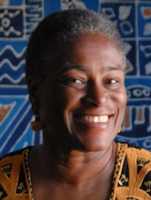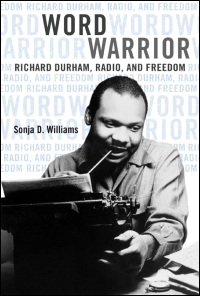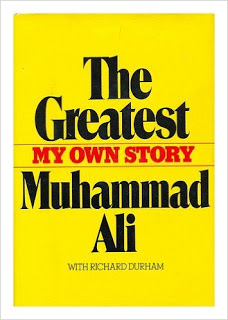

Those of you following this blog know that I have bouquets of beautiful things to say about Biographers International and their super-crunchy conference, which I attended last June in Washington DC. One of the biographers I was delighted to cross paths with there is Sonja D. Williams, whose biography, Word Warrior: Richard Durham, Radio, and Freedom has just been published by the University of Illinois Press. Herewith some Q & A.
C.M. MAYO: What inspired you to write this biography?
SONJA D. WILLIAMS: In fall 1994 I had just started working as a writer/producer for the Smithsonian Institution’s Black Radio: Telling It Like It Was project—a 13-part series exploring the legacy of African Americans in radio. (The Smithsonian’s National Museum of American History in Washington, D.C., housed a unit that produced award-winning radio and television documentaries about the American experience). So starting in January 1996, our weekly half-hour Black Radio programs aired on more than two hundred noncommercial radio stations nationwide.

Of the five shows on my producing plate, I felt the most trepidation about the one exploring African American contributions during radio’s “theater of the mind” heyday of the 1930s and 1940s. Blacks were rarely featured in local or national dramatic broadcasts then. When I found out about Destination Freedom, I was struck by this radio series’ lyricism, dramatic flair, and fiery rhetoric. African American writer Richard Durham created this series in 1948 and for two years he served as its sole scriptwriter. A master storyteller, Durham seductively conjured aural magic, inventively dramatizing the lives of black history makers.
And Durham used his desire for universal freedom, justice, and equality to inform his storytelling choices.
Richard Durham had died in 1984, so my interviews with his wife, Clarice, actor/singer Oscar Brown Jr., and writer Louis “Studs” Terkel provided salient insights. Durham was an astute, Chicago-based writer who employed poetic, hard-hitting prose to entertain, educate, and promote positive social change. He stood behind his convictions, even when the consequences of his actions caused him emotional pain, financial hardship—or both.
Durham’s accomplishments reinforced my own belief that the media, in all its incarnations, should serve a higher purpose than just mindless diversion. His life was drama itself, full of unexpected twists and turns, of creative invention and reinvention. His story certainly fascinated me. So after the Black Radio series ended, I planned to work on Durham’s biography.
Unfortunately, other documentary projects monopolized my time. I also continued teaching in my academic home, the Howard University Department of Radio, Television, and Film. Appointment to an administrative position in my department eventually forced me to sandwich research for this book into spring or summer breaks and other far-too-fleeting time frames.
Still, a Howard University–sponsored research grant in 2002 enabled me to begin immersing myself in Durham’s world. Later, a 2009 Timuel D. Black Jr. Short-Term Fellowship in African American Studies sponsored by the Vivian G. Harsh Society enabled me to spend a summer in Chicago. I practically moved into the Woodson Regional Library, home base of the Harsh Research Collection of Afro-American History and Literature, where Richard Durham’s papers reside. Finally, a sabbatical from my university during the 2010–11 academic year allowed me to make significant progress toward the completion of this book.
C.M. MAYO: Did Durham’s family help and/or cooperate with you?
SONJA D. WILLIAMS: Durham’s family members were extremely cooperative and supportive. Durham’s wife, Clarice Davis Durham (now 95), generously allowed me to interview her on numerous occasions, and she provided contact information for several of her husband’s longtime friends and colleagues. She also shared documents she had not donated to the Chicago Public Library’s Harsh Research Collection.
Mrs. Durham’s brother, Charles A. Davis and sister Marguerite Davis offered touching stories and historical perspectives about their brother-in-law, as did Richard Durham’s older sister Clotilde and younger brothers Caldwell and Earl. And Mark Durham, Clarice and Richard’s only son, provided a wealth of additional information and contacts.
C.M. MAYO: What were the most unexpected and biggest challenges for you in writing this book?
SONJA D. WILLIAMS: If someone had told me in the early 2000s that it would take between 10 and 15 years to complete Word Warrior, I would have been convinced that this person had abused some crazy, judgment-clouding substance. The longest documentary project on which I had worked, NPR’s and the Smithsonian’s 26-part series Wade in the Water: African American Sacred Music Traditions, was about five years in the making, from its conception by artist/historian Bernice Johnson Reagon to airdate.
But additional documentary, teaching and administration responsibilities, along with other life demands, soon proved that Word Warrior would take a lot longer to become a reality. And at times I had to overcome serious personal roadblocks. Was I really up to this challenge? Who told me I could write a book? Was I fooling myself?
I got past those doubts, but not without struggle – and time.
C.M. MAYO: I believe every book has many angels. Who were the angels for this book?
SONJA D. WILLIAMS: So many angels hovered over this project. Durham’s longtime friends, artist Oscar Brown Jr., journalist Vernon Jarrett and writer/radio personality Studs Terkel were generous with their time, recollections and insights. Historian J. Fred MacDonald, who died earlier this year, was an angel from the start, providing all types of audio and visual materials and regular encouragement.

Vivian Gordon Harsh, an African American woman I never met, served as an earthbound angel during Durham’s lifetime and a heavenly one in mine. During the 1940s, this pioneering head librarian created and curated a special collection of Negro books and historical documents in Chicago’s George Cleveland Hall Public Library. Durham spent hours there, combing through the research materials Harsh provided for his Destination Freedom and other projects. Today, the Harsh Collection is the largest African American archive in the Midwest. It also houses Richard Durham’s Papers.
And of course, my family members and close friends – angels all – divvied up places to stay, reality checks and butt-kicking critiques.
C.M. MAYO: Were you able to listen to all of Durham’s “Destination Freedom” radio shows? (Where are they archived?) Did you have some favorites– and why?
SONJA D. WILLIAMS: Of the 92 shows in the Destination Freedom series, I listened to all of the tapes that have survived. Northeastern Illinois University historian and author J. Fred MacDonald discovered and rescued those tapes and scripts from Northwestern University years ago and housed them in his own media archives (now located in the Library of Congress). From his archives, Dr. MacDonald sent me a huge box containing copies of every Destination Freedom script. I read every word. I also listened to Destination Freedom tapes in the archives of the New York Public Library’s Schomburg Research Center of Black Culture, and in the Richard Durham Papers archived in the Chicago Public Library’s Harsh Research Collection.
It’s rather hard to pick favorites from such a rich cache of dramatic programs. Of course, a few stand out for their storytelling strengths and messages:
The Rime of Ancient Dodger examined Jackie Robinson’s integration of baseball, starring Oscar Brown Jr. as Robinson and Studs Terkel as a Brooklyn-accented, rhyming narrator. Denmark Vesey recounted Vesey’s revolutionary militancy and his 1822 slave revolt in South Carolina; Negro Cinderella portrayed artist Lena Horne’s young life and social awakening; Premonition of a Panther demonstrated how his sport’s brutality affected boxing great Sugar Ray Robinson; The Death of Aesop displayed the biting humor and wisdom of an Ethiopian slave famous for his fables; The Long Road explored the contributions of women’s suffrage activist and educator Mary Church Terrell.

C.M. MAYO: Durham was Muhammed Ali’s biographer (The Greatest, 1975). Did you find it challenging to write the biography of a biographer?
SONJA D. WILLIAMS: In part because Muhammad Ali is such a huge personality and significant cultural figure – and because I was fascinated by his story and his fights during my younger years – Ali threatened to take over the chapter about Durham’s work with him on The Greatest. I had to fight with myself to make sure that Durham remained in focus by using Durham’s interviews with historian J. Fred MacDonald, magazine and newspaper articles where Durham talked about Ali, the tapes Durham personally recorded while following Ali during the writing of The Greatest, and relevant interviews with Durham’s friends, colleagues (including his Random House editor Toni Morrison) and family members.
C.M. MAYO: You’ve written for radio. Did you find writing a book to be similar or a very different process?
SONJA D. WILLIAMS: While I never thought that writing a book would be a breeze, the research process felt very familiar. It required the same primary and secondary research muscles needed for documentary production. I loved digging for information and finding unexpected gems – like Durham’s letters to and from acclaimed writer Langston Hughes, or learning about Durham’s interaction (along with other labor union leaders) with a young Rev. Martin Luther King Jr. Dr. King had journeyed to Chicago to seek financial support for the Montgomery, Alabama bus boycott he was leading. At that point, February 1956, the boycott was in its infancy and struggling to survive.
But writing for the page (or computer screen) is different that writing for the ear, and my early chapter drafts contained clunky chunks of interview segments or script samples. It was as if an unseen narrator (me) briefly set up an audio clip and then let the clip run uninterrupted, taking up a bulk of the page. While I could let audio segments, sound effects, ambient sound and/or music guide listeners in radio storytelling, it was clear that I had to take a more active role as narrator/guide for a book.
I had to reorient my mind and my writing. A struggle.
But if I learned anything from past projects, my work on Word Warrior cemented the fact that hard work, persistence, and faith are essential elements for any creative endeavor.
C.M. MAYO: What’s next for you?
SONJA D. WILLIAMS: I plan to return to my first love, music, and explore the lives, musical triumphs and personal struggles of some contemporary musicians. Wish me luck, faith and persistence!
> Visit Sonja D. Williams’ webpage
> Find Word Warrior on amazon.com
> Find Word Warrior at University of Illinois Press

Blood Over Salt in Borderlands Texas Q & A: Paul Cool on Salt Warriors
Notes on Wolfgang Schivelbusch’s The Railway Journey
Find out more about C.M. Mayo’s books, shorter works, podcasts, and more at www.cmmayo.com.

